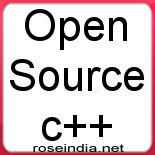Open Source c++
- Open
Source C++
During our professional experience we have had many problems in finding drivers for industrial control cards for not much proliferated platforms like Linux, OS/2 and other platforms. We believe that many industrial control system developers have the same problems. Another problem is that hardware vendors provide different interfaces for their drivers. Many industrial IO products are shipped with C (sometimes Visual Basic or Pascal) interface. However, very few manufacturers provide true object oriented C++ interfaces, despite the fact that most of professional software products nowadays are written in C++ not in C.
- Astronomy C/C++ source code
From time to time, I'm asked to provide source code for doing some sort of astronomical calculation, or for providing direct access to the numerous compressed datasets on the Guide CD-ROM. In the future, I intend to gather information about and links to all such source code on this page. The only use I make of C++ is in Windows user interface (MFC) code, and I haven't posted any of that yet. However, Mark Huss has produced a C++ implementation of much of this code. As much as possible, I've stuck with ANSI C. Most of the code has already been used in 16-bit DOS and Windows, and in 32-bit DOS and Windows. A make file for Linux is provided, and the code works there (but I've only used it to create a Linux version of Find_Orb, and not much else.) Mark Huss' C++ version also compiles in Linux. The only warning I'd offer in this regard is that I haven't dealt with a "wrong-end" byte order platform yet, and I am quite certain that much of the code will crash in grisly fashion on such systems.
- C++
Object Oriented Core Libraries
I am a huge believer of the concept of intellectual property, but also think there's something to be said about sharing. That said, this code should be considered under the BSD license model and not the GNU one. I don't have the BSD legal notices in the code yet, (too busy) but will have them in soon. I provide the C++ library source code as a courtesy to developers who build web based applications. The library is called 'open' because it is freely available, and because it's based on open standards like C++, the W3C DHTML DOM and STL. Its called 'core' because it's the basis for all of my systems. It's the component library we use for everything I do. The web server code is written in C++. Client browser code is object oriented JavaScript. (I haven't linked in the client JavaScript code yet, but will soon!) Both C++ and JavaScript libraries are almost exclusively composed of objects.
- Open
Source C++ Source code
Applied Synergetics has chosen to release several software projects under the Gnu General Public License (GPL). The intent is to promote the development and use of open source software among our community of users. DOME is a program which calculates the properties of a geodesic dome symmetry triangle. DOME calculates spherical vertex coordinates, symmetry triangle topological abundance, and chord factors. DOME supports class I (alternate) and class II (triacon) breakdowns for Icosahedron, Octahedron and Tetrahedron polyhedron types. DOME also supports "Buckyball" formations as well as elliptical geodesics. C++ source code is included.
- Open
Source C++ GUI Programming Qt3
The Qt toolkit is a C++ class library and a set of tools for building multiplatformGUI programs using a "write once, compile anywhere" approach. Qt lets programmers use a single source tree for applications that will run on Windows95 to XP, Mac OS X, Linux, Solaris, HP-UX, and many other versions of Unix with X11.A version of Qt is also available for Embedded Linux, with the same API. The purpose of this book is to teach you how to write GUI programs using Qt 3.The book starts with "Hello Qt" and quickly moves on to more advanced topics, such as creating custom widgets and providing drag and drop. The text is complemented by a CD that contains the source code of the example programs. The CD also provides Qt and Borland C++ for Windows, Qt for Unix, and Qt for Mac OS X. Appendix A explains how to install the software.
- Open
source C++ Applications
Here is a list of systems, applications, and libraries that are completely or mostly written in C++. Naturally, this is not intended to be a complete list. In fact, I couldn't list a 1000th of all major C++ programs if I tried, and this list holds maybe 1000th of the ones I have heard of. It is a list of systems, applications, and libraries that a reader might have some familiarity with, that might give a novice an idea what is being done with C++, or that I simply thought "cool". I have a preference of C++ style code over code that are called C++ even though it is mostly C and try to avoid list C or "almost C" programs. Many of the detailed descriptions are the words of the respective systems' developers and users, rather than mine. The organization of this list is idiosyncratic. Where a set of applications are clearly associated with a single organization, I list it under the name of that organization, but some systems doesn't fit that pattern.
